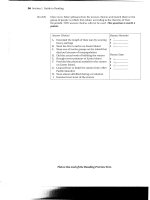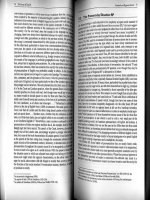Being structure sound 8 pot
Bạn đang xem bản rút gọn của tài liệu. Xem và tải ngay bản đầy đủ của tài liệu tại đây (88.18 KB, 6 trang )
The correct answer is b, “Mr. Miller may have left
his car door unlocked the day the radio was stolen.”
How can you tell? Because this is the only idea that all
of the sentences in the neighbor’s statement support.
You know that Mr. Miller often doesn’t lock his car
doors; you also know that he often forgets thing. The
combination makes it likely that Mr. Miller left his car
door unlocked on the day his car radio was stolen.
Practice Passage 3
Now look at a paragraph in which the language the
writer uses is what enables you to determine meaning.
Here is a description of Coach Lerner, a college bas-
ketball coach, written by one of his players. Read the
paragraph carefully and see if you can determine the
implied main idea of the paragraph.
Coach Lerner, my basketball coach, is six feet ten
inches tall with a voice that booms like a foghorn and
the haircut of a drill sergeant. Every morning, he
marches onto the basketball court at precisely 8:00
and dominates the gymnasium for the next three
hours. He barks orders at us the entire time and
expects that we will respond like troops on a battle-
field. And if we fail to obey his commands, he makes
us spend another 45 minutes under his rule.
Before you decide on the implied main idea, list
your observations. What did you notice about the lan-
guage in this paragraph? An example is provided to get
you started.
Your Observations:
Example: I noticed that Coach Lerner’s voice is
compared to a foghorn.
3. Which of the following best expresses the
implied message of the passage?
a. Playing on Coach Lerner’s team is difficult.
b. Playing on Coach Lerner’s team is like being
under the command of an army general.
c. Coach Lerner is a terrible basketball coach.
Answer
The correct answer is b, “Playing on Coach Lerner’s
team is like being under the command of an army gen-
eral.”There are many clues in the language of this para-
graph that lead you to this inference. First, you probably
noticed that Coach Lerner’s voice “booms like a
foghorn.” This comparison (called a simile) suggests
that Coach Lerner wants his voice to be heard and
obeyed.
Second, the description of Coach Lerner’s haircut
is a critical part of the way the author establishes the
tone of this paragraph. To say that he has “the haircut
of a drill sergeant” (also a simile) makes us think of a
military leader whose job it is to train soldiers. A writer
wouldn’t use this comparison unless he or she wanted
to emphasize military-like discipline.
The author tells us that Coach Lerner “marches
onto the basketball court,” “barks orders,” and expects
his players to respond like “troops on a battlefield.”
The writer could have said that Coach Lerner “strides”
onto the court, that he barks “instructions,” and that he
expects his players to act like “trained dogs.” However,
since the author is trying to paint a picture of Coach
Lerner that will bring to mind a military leader, he
uses words that convey military ideas. Thus, though
answers a and c may be true—it might be difficult to
play for Coach Lerner and he might be a terrible bas-
ketball coach—answer b is the only idea that all of the
sentences in the paragraph support.
Of course, this person’s description of Coach
Lerner is very subjective, using as it does the first-
person point of view. As an active reader, you should
wonder whether everyone sees Coach Lerner this way
or if this player is unable to be objective.
– FINDING THE IMPLIED MAIN IDEA–
121
Practice Passage 4
Many people find reading literature a difficult task
because in literature (fiction, drama, and poetry), the
main idea is almost never expressed in a clear topic sen-
tence. Instead, readers have to look for clues often hid-
den in the language of the text. For example, the
following fictional paragraph describes a character.
Read it carefully, make your observations, and then
identify the main idea of the paragraph:
Every morning when Clara arrives at the gym, she is
greeted with a buzz of warm hellos. She starts her
workout in the weight room, where her exercise reg-
imen is always peppered with lively chats with those
around her. She then moves on to the pool, where
she stops and converses with other friends and
acquaintances before diving in and swimming laps.
As she swims, her sole focus is the calming sound of
her body gliding through the water—a rare moment
in her always very social days.
Your Observations:
Example: I noticed that Clara talks with many people.
4. The main idea of this paragraph is that
a. Clara is shy.
b. Clara knows everyone at the gym.
c. Clara is very friendly.
Answer
Although it is possible that b, “Clara knows everyone
at the gym,” there is no evidence in this paragraph to
support that inference. Thus, b cannot be the main
idea. Answer a, “Clara is shy,” cannot be the correct
answer either, since everything in the paragraph sug-
gests that Clara is, in fact, quite outgoing.
Furthermore, the language of the paragraph cre-
ates a feeling of warmth and friendliness: Clara is
greeted with “warm hellos” and she has “lively chats”
and conversations with friends and acquaintances. She
also has “very social days.” All these words work
together in the paragraph to paint a picture of some-
one who is very friendly and social. Thus, without
directly saying so, the writer tells us that c, “Clara is
very friendly.”
Summary
Many writers use implication to convey meaning rather
than directly stating their ideas. This is especially true
in literature, where readers generally prefer suggestion
to direct statements. Finding the implied main idea
requires a little detective work, but it is not as difficult
as you may have thought, now that you know more
about language and the way words can be used to sug-
gest ideas.
– FINDING THE IMPLIED MAIN IDEA–
122
– FINDING THE IMPLIED MAIN IDEA–
123
■
Listen carefully to people today. Are there times when they imply things without directly saying them?
Are there times when you use suggestion to get your ideas across? How do you do this? Be aware of
how you and others use indirect language and suggestion to convey meaning.
■
Write a paragraph that does not have a topic sentence. You should have a clear idea of the main idea
before you write your paragraph and make sure your sentences use language that will help your read-
ers understand your main idea. For example, think of a topic sentence about the kind of person you
are, but don’t write it down. Then, write several sentences that support your topic sentence with lan-
guage that leads your reader to the proper conclusion. You may want to show your paragraph to others
to see if they can correctly infer your main idea.
Skill Building until Next Time
ave you ever regretted just “telling it like it is”? Many times, you can’t come right out and say what
you’d like, but like writers, you can get your ideas across through implication or inference.
This lesson focuses on two specific types of implication: reading between the lines to deter-
mine cause and reading between the lines to predict effects.
In case you need a reminder: A cause is the person or thing that makes something happen or produces an
effect. An effect is the change that occurs as a result of some action or cause. Cause tells us why something hap-
pened; effect tells us what happened after a cause (or series of causes).
LESSON
Assuming
Causes and
Predicting
Effects
LESSON SUMMARY
Today’s lesson focuses on how to determine cause and effect when
they are only implied, rather than explicitly stated.
17
125
Determining Implied Causes
In order to see how to determine causes that are implied
rather than stated, look at the following brief fictional
passage. Read the passage carefully and actively. After
you make your observations, see if you can use the
writer’s clues to determine why the characters are
fighting.
Anne sat with her feet up on the couch, drinking a
Coke. She heard footsteps by the front door. Brenda
was right on time, as usual. Never a minute early or
late—for her, everything was very exact.
Anne placed her feet on the floor, reached for
the remote, and turned off the television. She knew
Brenda would demand her complete attention. She
knew Brenda would hang up her coat in the closet by
the door (third hanger from the left) and then head
to the kitchen for her daily inspection (exactly seven
steps). She knew this because they had been room-
mates for six months. Taking a deep breath, she
thought about what she would say to Brenda. She
waited and watched from her spot on the couch.
A moment later, Brenda stepped into the
kitchen and surveyed the scene. Anne watched her
expression, watched her eyes focus on the sink, and
watched her face harden when she saw the dishes
piled high. Pointing to the dishes, Brenda said dis-
appointedly, “I don’t believe what I’m seeing. I
thought we agreed to share the responsibilities. I
thought it was your turn to clean the kitchen this
week?”
“I haven’t gotten to them yet,”Anne replied. “I’ve
been really busy. Relax. I’ve got all night.” She walked
into the kitchen and added her empty glass to the top of
the pile.
Brenda fumed. “You know I’m having com-
pany tonight! Somehow I thought you would have
done your share in the kitchen. If we want to remain
roommates, things have to change. ”
The phone rang, and Anne darted to answer it.
Brenda said in the background, “Tell them to
call back, we need to settle this now. I told you I’m
having company soon.”
Anne ignored Brenda’s comment and contin-
ued to engage in conversation with a good friend of
hers. “Did I ever tell you about the time when . . .”
Look carefully at the dialogue between these two
characters. What do they say to each other? How is it said?
What other clues from the author can you find in this pas-
sage to help you understand the cause of their conflict?
List your observations below and then answer the ques-
tions that follow.
Your Observations:
Example: I noticed that Anne was relaxing and watch-
ing TV when Brenda arrived.
1. Why does Brenda get angry?
a. because Anne is unfriendly
b. because she had a bad day at work
c. because Anne didn’t do the dishes
d. because Anne is lazy
2. Why didn’t Anne do the dishes?
a. She didn’t have time to do them.
b. She wanted to start a fight.
c. She was too lazy.
d. She wants Brenda to get a new roommate.
– ASSUMING CAUSES AND PREDICTING EFFECTS–
126









